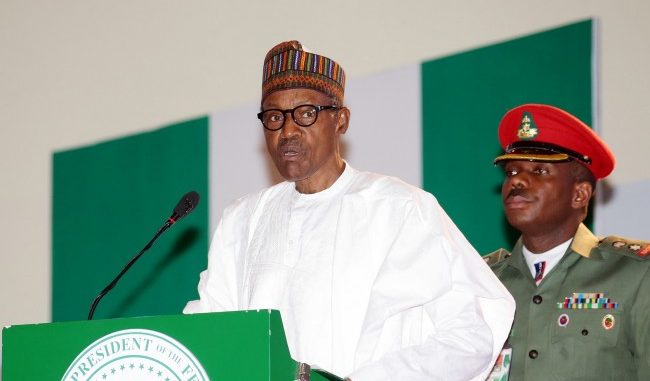
By Camillus Eboh
ABUJA (Reuters) – Nigerian President Muhammadu Buhari on Tuesday sent a draft budget framework for 2017 to parliament for approval, detailing plans to spend a record 6.866 trillion naira ($22.57 billion) aimed at pulling Africa’s biggest economy out of recession.
The planned spending is up from this year’s 6.06 trillion naira budget and seeks to stimulate growth in Africa’s most populous nation by funding infrastructure development to increase manufacturing, create jobs and reduce costly imports.
Nigeria, an OPEC member, slipped into recession for the first time in more than 20 years in the second quarter largely due to low global oil prices. Crude oil sales account for about two-thirds of government revenue.
“The thrust of the fiscal year 2017 budget is to restore the economy to a sustainable inclusive growth path,” said the document, adding that the focus is to “utilise targeted spending in critical sectors that have quick transformative capabilities.”
The framework has spending plans for 2017 to 2019 and must be approved by the Senate before the final budget for next year is submitted.
It could be months before a final budget is passed into law. The 2016 budget became law in May after being delayed by several weeks due to wrangling between the government and Senate.
Problems related to oil prices have been exacerbated by attacks on energy facilities that have cut crude production, which was 2.1 million barrels per day (bpd) at the start of 2016, by 700,000 bpd.
Buhari’s plan assumes production of 2.2 million bpd in 2017 at a price of $42.50 per barrel.
It sees production rising to 2.3 million bpd and 2.4 million bpd in 2018 and 2019 at an average price of $45 per barrel and $50 per barrel respectively.
Brent crude settled down 2 cents at $50.87 a barrel on Tuesday after rising earlier to $51.37, its highest since June 10, on optimism about planned OPEC output cuts.
Nigeria’s growth has been stunted for decades by a lack of investment in its power, road and rail network. And the president has repeatedly stated the need to expand the country’s manufacturing base to end the reliance on crude exports and cut the country’s $20 billion annual food import bill.
The document said the spending plans sought to create a “more developed infrastructure base” in order to “stimulate real sector productivity, job creation and increased private sector investment.”
The naira has lost more than a third of its official value since a peg holding it at 197 to the U.S. dollar was removed in June after 16 months. The currency has hit record lows against the dollar on the black market in recent weeks.
The proposal sent to parliament on Tuesday assumes an exchange rate of 290 naira to the U.S. dollar and projects gross domestic product (GDP) to grow by 3.0 percent in 2017. GDP contracted by 2.1 percent in the second quarter of this year.
And inflation, which hit an 11-year high of 17.6 percent in August, is “expected to moderate to 12.92 percent” next year. ($1 = 304.2500 naira) (Writing by Alexis Akwagyiram; Editing by Louise Ireland and Cynthia Osterman)